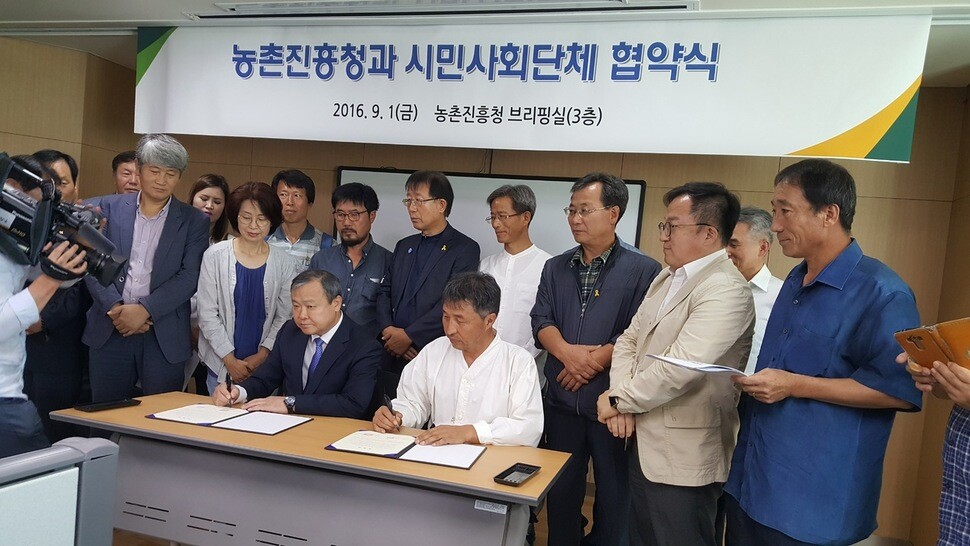hankyoreh
Links to other country sites 다른 나라 사이트 링크
South Korean government to shut down GMO-related development project

The South Korean government has agreed to shut down a project that has been accused of being a step toward commercializing genetically modified organisms (GMOs) and to set up a joint committee with civic groups to hold regular deliberations about GMO research plans. This has earned the government credit for creating a framework that allows civic society to take part in governance instead of unilaterally ramming through its policies.
On the morning of Sept. 1, the Rural Development Administration (RDA) and the North Jeolla Residents’ Campaign against GMOs signed an agreement at the RDA office in Jeonju, North Jeolla Province, in which the RDA agreed “not to promote the production of genetically modified crops” and promised to shut down its Genetically Modified Crop Development Project by the end of the year. The project had been suspected of being designed to promote the commercialization of genetically modified crops.
The RDA also promised that crop testing which had taken place next to its office would be relocated to a place with safety facilities and that those tests would be conducted on a limited basis. Tests on genetically modified rice, peppers and wheat had raised the ire of local farmers and civic groups.
The two sides agreed to set up what is tentatively being called the Committee of Agriculture & Life to solicit public opinions about the current issues facing farmers and the safety of food and to review research plans. The committee will be composed of 20 people altogether, with each side contributing 10 members. According to the agreement, the RDA will notify the public about GMO-related studies by posting such research to its website and holding information seminars. It will also organize an environmental impact study on the soil in areas near its research facilities through a public-private partnership.
From Oct. 2015 until recently, the residents’ campaign held demonstrations protesting the establishment of the Genetically Modified Crop Development Project and the operation of the experimental agricultural facility, which it said represented government attempts to commercialize GMOS. It also held a tent sit-in near the genetically modified crop testing ground that began on Apr. 22 and lasted for more than 130 days.
“This agreement is an example of dividing governance between civic society and the executive branch. This will serve as a fresh opportunity to listen to the opinions of the public and the local community and to establish policies aimed to benefit South Korean agriculture, rural areas and farmers,” said Hwang Gyu-seok, head of the RDA’s Bureau of Policy Research.
The residents’ campaign regards the agreement as a turning point to stop government-led development and production of GMOs and to safeguard the country against GMOs while revitalizing agriculture and rural areas. “We’re grateful to the RDA for making a difficult decision. In the future, we will be working to require that all foods containing GMOs be labeled as such and banning GMOs from school food,” said Lee Se-woo, president of the residents’ campaign.
While the government will be shutting down its crop testing program, it plans to continue related research. “We can’t produce genetically modified crops as long as there are public concerns that such crops may be harmful, but we are obligated to carry on research to prepare for possible developments in the distant future. However, we will proceed following consultation with civic society and experts about the manner in which we should continue this research to avoid making the public nervous,” said an official with the Ministry of Agriculture, Food and Rural Affairs.
By Park Im-keun, North Jeolla correspondent and Heo Seung, staff reporterPlease direct questions or comments to [english@hani.co.kr]

Editorial・opinion
![[Column] Season 2 of special prosecutor probe may be coming to Korea soon [Column] Season 2 of special prosecutor probe may be coming to Korea soon](https://flexible.img.hani.co.kr/flexible/normal/500/300/imgdb/original/2024/0426/3317141030699447.jpg) [Column] Season 2 of special prosecutor probe may be coming to Korea soon
[Column] Season 2 of special prosecutor probe may be coming to Korea soon![[Column] Park Geun-hye déjà vu in Yoon Suk-yeol [Column] Park Geun-hye déjà vu in Yoon Suk-yeol](https://flexible.img.hani.co.kr/flexible/normal/500/300/imgdb/original/2024/0424/651713945113788.jpg) [Column] Park Geun-hye déjà vu in Yoon Suk-yeol
[Column] Park Geun-hye déjà vu in Yoon Suk-yeol- [Editorial] New weight of N. Korea’s nuclear threats makes dialogue all the more urgent
- [Guest essay] The real reason Korea’s new right wants to dub Rhee a founding father
- [Column] ‘Choson’: Is it time we start referring to N. Korea in its own terms?
- [Editorial] Japan’s rewriting of history with Korea has gone too far
- [Column] The president’s questionable capacity for dialogue
- [Column] Are chaebol firms just pizza pies for families to divvy up as they please?
- [Column] Has Korea, too, crossed the Rubicon on China?
- [Correspondent’s column] In Japan’s alliance with US, echoes of its past alliances with UK
Most viewed articles
- 1Samsung subcontractor worker commits suicide from work stress
- 2‘We must say no’: Seoul defense chief on Korean, USFK involvement in hypothetical Taiwan crisis
- 3Is Japan about to snatch control of Line messenger from Korea’s Naver?
- 4Division commander ordered troops to enter raging flood waters before Marine died, survivor says
- 5[Editorial] Korea’s surprise Q1 growth requires objective assessment, not blind fanfare
- 6No good, very bad game for Korea puts it out of Olympics for first time since 1988
- 7US overtakes China as Korea’s top export market, prompting trade sanction jitters
- 8Korea’s 1.3% growth in Q1 signals ‘textbook’ return to growth, says government
- 9N. Korean delegation’s trip to Iran shows how Pyongyang is leveraging ties with Moscow
- 10[Column] Season 2 of special prosecutor probe may be coming to Korea soon